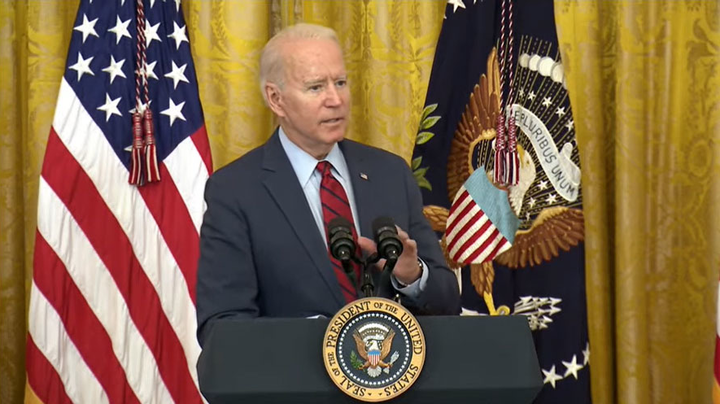The White House says the deal represents the largest federal investment in transit and the most in Amtrak since the passenger rail service’s inception.
The Biden Administration has given its blessing to an infrastructure deal reached by a bipartisan group of 10 U.S. senators. The deal represents a $973-billion investment over five years and $1.2 trillion over eight years in baseline and new spending.

President Joe Biden addresses the press on June 24 following the release of the bipartisan infrastructure deal framework.
Screenshot from White House live stream

The framework of the deal was released by the White House June 24 and includes $579 billion in new investments. Transportation spending accounts for $312 billion, plus an additional $266 billion in other infrastructure spending, such as water, broadband and resiliency investments.
During a press briefing to discuss the infrastructure deal, President Joe Biden noted its was a “huge day for one half of my economic agenda, the American Jobs Plan.” The plan, as outlined by the president earlier this year, originally called for transportation investments of $621 billion over eight years.
“We’ve devoted far too much energy to competing with one another and not nearly enough energy competing with the rest of the world…Investments that we will be making as a result of this deal are long overdue,” said President Biden. “Neither side got everything they want in this deal…that’s what it means to compromise.”
What is included in the deal is $49 billion in public transit investments, an additional $7.5 billion for school and transit fleets to transition to electric and $66 billion for passenger and freight rail investments.
A fact sheet on the bipartisan framework from the White House stated the deal represented “the largest federal investment in public transit in history and is the largest federal investment in passenger rail since the creation of Amtrak.”
Other highlights of the framework include $20 billion for infrastructure financing, which the White House says will “create a first of its kind Infrastructure Financing Authority that will leverage billions of dollars into clean transportation and clean energy.”
The framework also includes $47 billion for resilience investments that the White House notes will “prepare more of our infrastructure for the impacts of climate change, cyber attacks and extreme weather events.”
According to the White House, the following options are under consideration as ways to pay for the proposed infrastructure investment:
• Proposed Financing Sources for New Investment
• Reduce the IRS tax gap
• Unemployment insurance program integrity
• Redirect unused unemployment insurance relief funds
• Repurpose unused relief funds from 2020 emergency relief legislation
• State and local investment in broadband infrastructure
• Allow states to sell or purchase unused toll credits for infrastructure
• Extend expiring customs user fees
• Reinstate Superfund fees for chemicals
• 5G spectrum auction proceeds
• Extend mandatory sequester
• Strategic petroleum reserve sale
• Public-private partnerships, private activity bonds, direct pay bonds and asset recycling for infrastructure investment
• Macroeconomic impact of infrastructure investment
President Biden reiterated his pledge to pay for the infrastructure deal without raising taxes on earners making less than $400,000 per year.
During a press briefing on the infrastructure deal, President Biden noted there was “plenty of work ahead to bring this [deal] home” but added “the American people can be proud today.”
The American Public Transportation Association (APTA) commended the effort to produce the deal and APTA President and CEO Paul Skoutelas issued the following statement:
“Our nation demands forward-looking infrastructure investment that modernizes public transit and passenger rail systems and meets the growing and evolving mobility demands of communities. We have a once-in-a-generation opportunity to help our communities meet growing mobility demands, create family-wage jobs, expand U.S. manufacturing and supply chains, and grow the economy.
“While optimistic about the proposed bipartisan framework, APTA reiterates its strong support for H.R. 3684, the INVEST in America Act, which will put American infrastructure on a footing to compete with any country in the world. APTA strongly supports the bill and its critical investments for surface transportation infrastructure, including $109 billion for public transportation and $95 billion for commuter rail, Amtrak and other high-performance rail. The INVEST Act will put the country on a path to increase access to opportunities for all Americans and build more equitable communities, while also addressing the environmental and sustainability challenges facing our communities, nation, and the world.
“The time is now to make transformational investment in our national infrastructure that will provide staying power to drive our economy for years to come.”
Read More Here